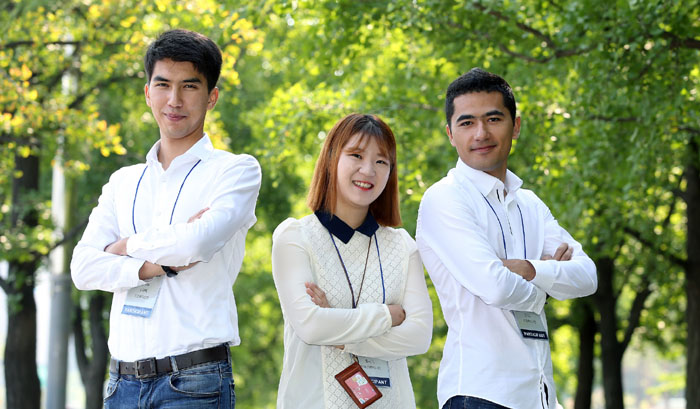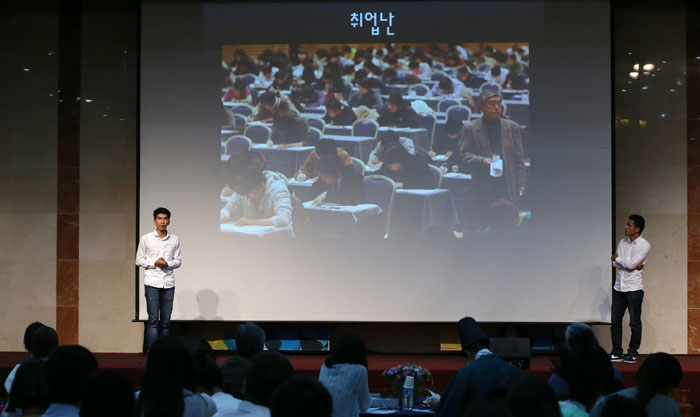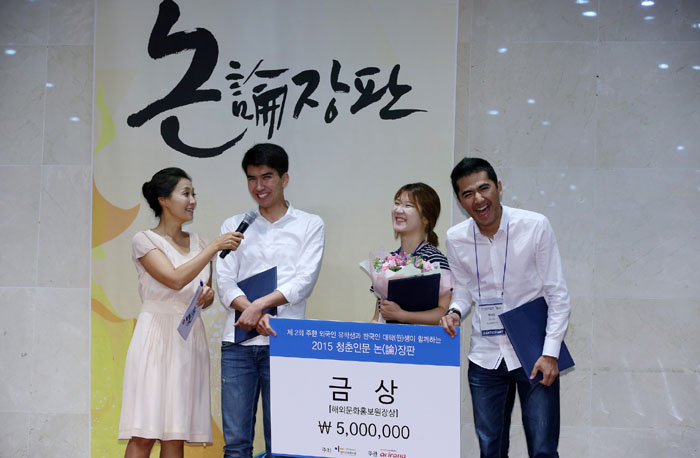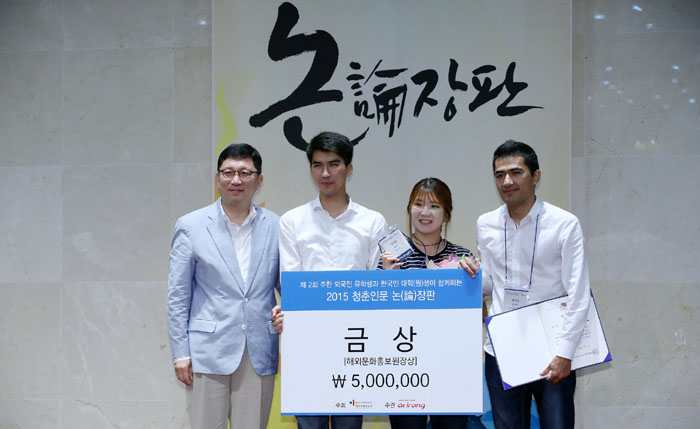
The Bukkeukseong team, one of the participating teams in the 2015 'Exploring Korean Humanities Together' competition, consists of members from Korea, Russia and Uzbekistan. The team focused on Kim Byeong-hwa (1905-1974), who established and led a successful collective farm in Soviet Uzbekistan. Team members Anvarov Oybek (left) and Akbarov Jamshid (right), both from Uzbekistan, and Hong Seo-ri (center) from Korea, pose for a photo.
The 2015 "Exploring Korean Humanities Together" competition kicked off on July 4 in Jecheon, Chungcheongbuk-do Province (North Chungcheong Province). It brought together college students from many parts of the world, allowing them to give a series of presentations on historical Koreans.
The Bukkeukseong team, meaning "the North Star" in English, came in second with their presentation on Kim Byeong-hwa (1905-1974), an ethnic Korean Soviet citizen in Uzbekistan who established and successfully headed a kolkhoz, or collective farm, during Soviet times that was called Bukkeukseong.
The team consisted of four college students: Akbarov Jamshid and Anvarov Oybek, both Uzbekistani students studying at Yonsei University and Seoul National University, respectively, Glotova Olga, a Russian student at Seoul National University, and Hong Seo-ri, a Korean student at Semyung University.

The Bukkeukseong team from Korea, Russia and Uzbekistan gives a presentation about the head of a collective farm in Soviet Uzbekistan, Kim Byeong-hwa (1905-1974), during the 'Exploring Korean Humanities Together' competition on July 4.
The students worked on the project over the months leading up to the competition, getting their hands on anything related to Kim and his life. They found that Kim and his family crossed the border into the USSR from Korea when he was nine years old, in 1914. In the USSR, the family lived hand-to-mouth by doing odd farm jobs. Many ethnic Koreans living in the USSR, unfortunately, were forced to move from the Far East to Uzbekistan on Stalin's orders in 1937. Among them was Kim's family. They had to start a new life in a new land. In 1938, Kim led some of the ethnic Koreans to help him build a kolkhoz and called it Bukkeukseong. He developed it into one of the most prosperous farms in all of the Soviet Union.
One of the Uzbekistani students, Anvarov Oybek, even flew to his home country to visit the Kim Byeong Hwa Museum as part of his research. There, he interviewed people working at the museum and obtained as much information about Kim as possible. His story and the path he chose to take in his new country ignited admiration for what he did among the students. They called him, "A person who served as the main pillar for traumatized ethnic Koreans, people who had to adjust to a strange, new environment, offering them strong leadership," and, "A person who successfully headed the Bukkeukseong farm and cheered up the farmers, helping them to stand up again and to not lose their national spirit."
The students also carried out a brief survey, targeting people on the street at Gwanghwamun Plaza in Seoul. The results showed that more than 95 percent of people have never heard of Kim. They repeated the survey in Tashkent, the capital of Uzbekistan, and found that more than 60 percent of people knew about him.
"Kim was born in Korea during Joseon times, escaped poverty, moved to Russia and settled in Uzbekistan. Our team is a cross-cultural team of students from the three nations that Kim experienced: Korea, Russia and Uzbekistan. His story involves all our nations," said Akbarov Jamshid when asked about why they chose the figure.

Members of the Bukkeukseong team give an acceptance speech after winning second place in the competition.

Korean Culture and Information Service (KOCIS) Director Park Younggoog (left), the host of the competition, poses for a picture with the runner-up team.
Looking deeper into the life of this historical person, the students realized that he had been the kind of person who always embraced in his mind his homeland, his people and his patriotism, throughout his life. "He knew how to lead people, was always considerate of others and let the ethnic Koreans know what ideal communalism was like," they said.
They came to the conclusion that, "Our society needs true leaders like Kim, people who are willing to take the lead and make sacrifices for the people. Kim was the start of what is the close, amicable relationship between Korea and Uzbekistan today."
By Sohn JiAe
Photos: Jeon Han
Korea.net Staff Writers
jiae5853@korea.kr